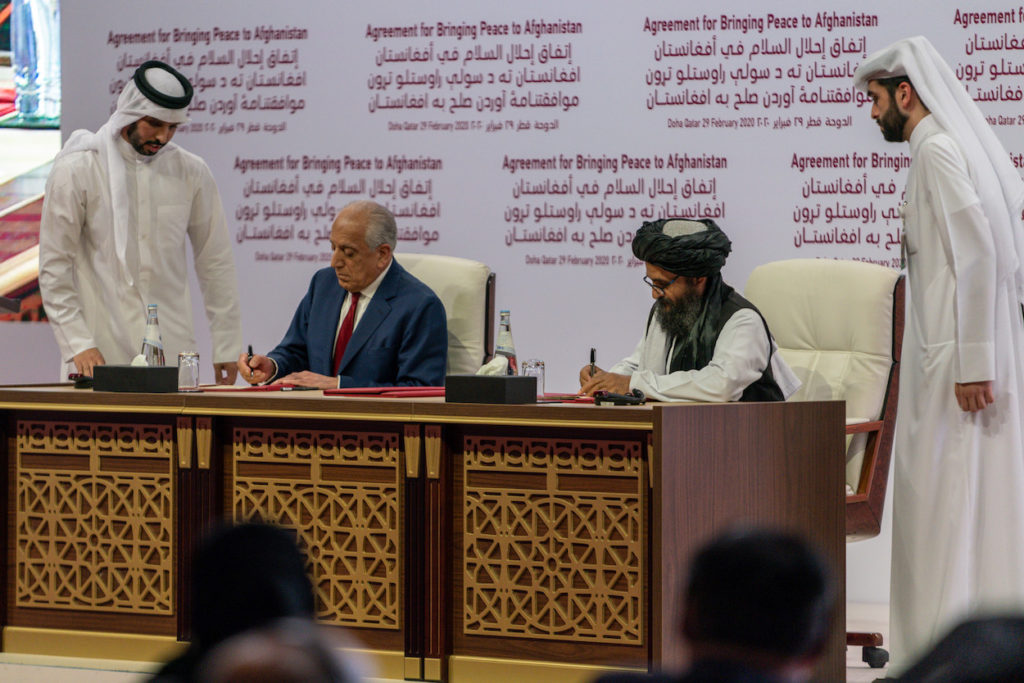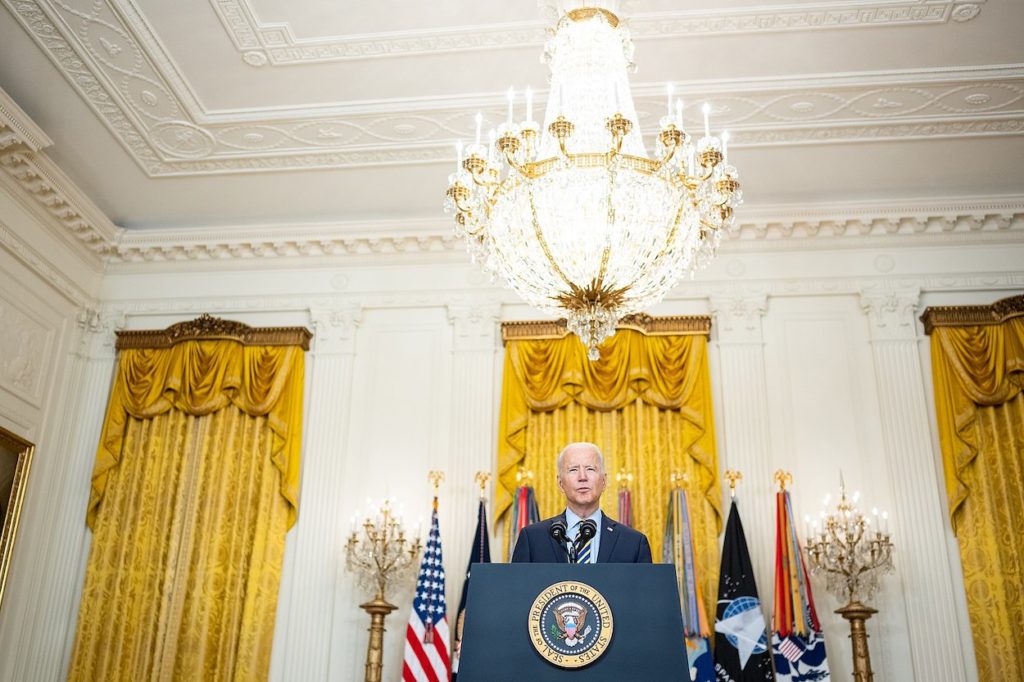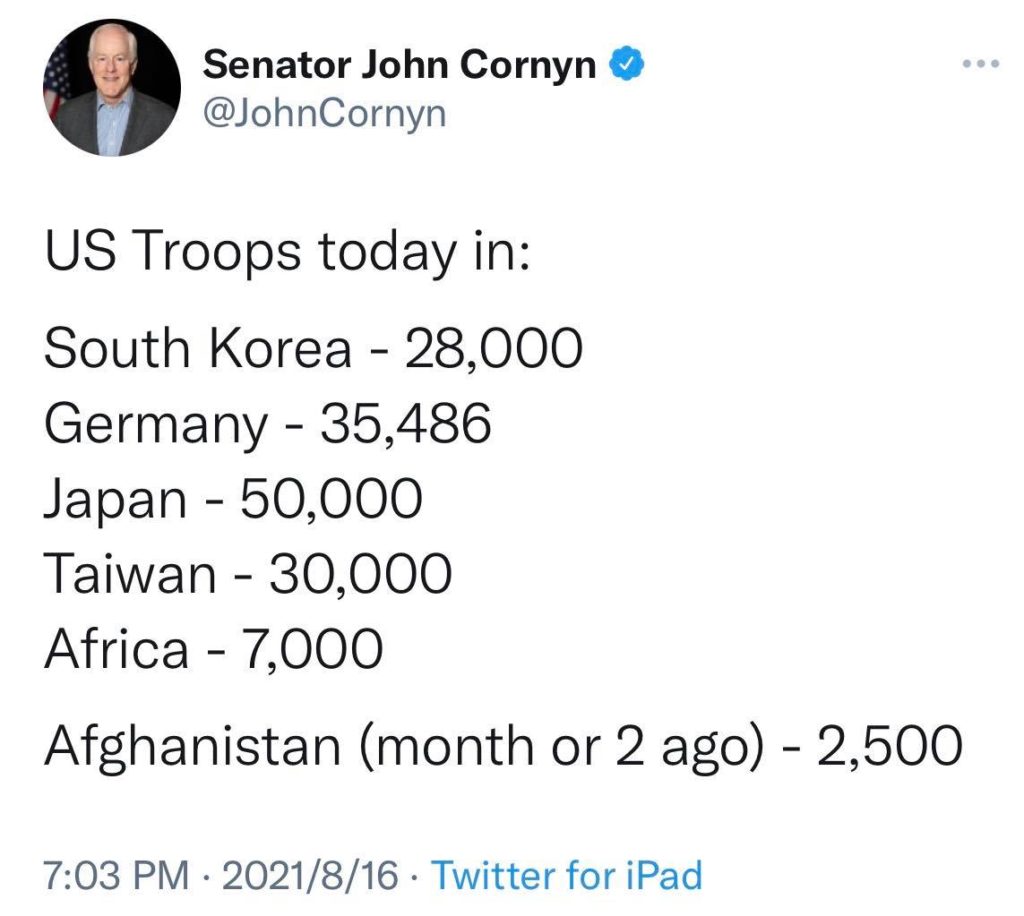by Brian Hioe
語言:
English
Photo Credit: 玄史生/WikiCommons/CC
OVER THE PAST few days, much of the world has been fixed on the spectacle of the resurgent Taliban taking provincial capitals across Afghanistan, eventually sweeping the capital of Kabul. It may not be surprising that there has been a wave of discussion of how Taiwan relates to this series of events, if at all. Many of these responses have been sharply divided. One can roughly categorize four different types of responses.
First, some responses have sought to suggest that the US withdrawal from Afghanistan suggests similar unreliability for Taiwan, seeing as the US is Taiwan’s major security guarantor from the threat of Chinese invasion. One has seen Chinese state-run media outlets and nationalistic “wolf warrior” diplomats trumpeting this, along with members of the KMT, who have sought to attack the Tsai administration for what it frames as its overreliance on the US. The US is, the KMT claims, an unstable partner.
Facebook post by President Tsai Ing-wen on Taiwan’s military readiness vis-a-vis Afghanistan
Secondly, there are those who vehemently insist that Afghanistan has no lessons for Taiwan, that US decisionmaking vis-a-vis Taiwan occurs in a separate frame, and that Taiwan should not be concerned about the US withdrawal from Afghanistan. One has seen this response from a number of western experts on Taiwan.
Thirdly, one has seen the insistence from still others that events in Afghanistan indicate that the US should redouble efforts to defend Taiwan, with the view that because China has pointed to the withdrawal as a sign of US weakness, the US should instead shore up Taiwan as a show of strength. This view has often come from Republican foreign policy hawks.
Lastly, others take the view that the US is bound to increase support for Taiwan after the withdrawal from Afghanistan. This is arguing that would Republican hawks in the aforementioned category phrase as what should occur, in fact, will occur by matter of course.
All four of the above views are flawed. Yet these views in themselves are telling, as they all capture a fragment of a more complex reality. We might examine this.
EXPERTS BY and large do not see Taiwan and Afghanistan in the same frame and are quick to point to the differences between the two contexts, which make comparisons difficult. And certainly, comparisons between the two situations are somewhat absurd. Geopolitical and socioeconomic factors, which inform geopolitics, are simply too different.
For example, though one has seen crude attempts to insist that semiconductors are equivalent to oil, with the view that the US was motivated to invade Afghanistan for oil, Afghanistan is not vital to global supply chains the way that Taiwan is. Afghanistan’s GDP per capita was the 186th largest of more than 200 countries in 2021, according to the International Monetary Fund (IMF). Taiwan’s economy by GDP per capita was the 31st largest in 2021, according to the IMF. Taiwan’s significantly larger economy also means that China would be disincentivized to take military action because of the large effects this would have on the stability of the regional economy—including the potential effects that this would have on the Chinese economy, which was slowing before the start of the COVID-19 outbreak, and is due to be outpaced by the US economy.
The effects of the fall of Afghanistan on the US will not be felt globally on the level that a Chinese invasion of Taiwan would be either. That is, there are no two rival nuclear-armed superpowers that will possibly be drawn into war because the Taliban has taken over Afghanistan in the way that the US might be drawn into conflict with China if it invades Taiwan. Though nuclear war is very unlikely, the prospect of even limited conflict with the US also disincentivizes a Chinese invasion of Taiwan unless it is willing to hazard the risks of escalation.
 US representative Zalmay Khalilzad (left) and Taliban representative Abdul Ghani Baradar (right) signing the 2020 Doha Agreement. Photo credit: US Department of State/Public Domain
US representative Zalmay Khalilzad (left) and Taliban representative Abdul Ghani Baradar (right) signing the 2020 Doha Agreement. Photo credit: US Department of State/Public Domain
There is no comparison between the two scenarios in terms of Taiwan’s capacity to defend from a Chinese invasion, with the death toll of a Chinese invasion of Taiwan estimated to run in the thousands, if not hundreds of thousands. This returns to the fact that Taiwan is easily defensible as an island. The Taliban was an internal threat in Afghanistan, not an external one, and China’s proxies in Taiwan are not exactly armed militants.
The regional outlook of the Middle East and Asia Pacific cannot be compared either. Taiwan has regional allies that could possibly come to its aid, most notably Japan. This was not the case with the government in Afghanistan, in which foreign intervention from a third power to block the Taliban was not a prospect. China would have to hazard the risk of conflict with Japan, too, if it were to invade Taiwan.
This does not mean that there is not a scenario in which Taiwan finds itself contending against a Chinese invasion alone. But the comparison between Taiwan and Afghanistan is primarily based on the fact that they both involve the US potentially losing a client state to hostile forces, resulting in a show of US weakness. It is hard to compare the two contexts in any other way—though, again, this does not mean that the US would not drop support for Taiwan if this went beyond rationally acceptable losses. It has too often been the case that Taiwan has failed to take note of the US abandoning support for allies elsewhere in the world—the fate of Kurdish fighters in Syria is another recent example—and viewed itself only through the lens of particularity, failing to take note of the broader pattern of US abandonment of allies.
Nevertheless, the fact that the implicit comparison has been raised between Taiwan and Afghanistan and now circulates in both US and Taiwanese political discourse cannot be shrugged off. Events in Afghanistan have arguably already had an impact on Taiwan. One need simply look at the Taiwanese media discourse in the past few days, which has been dominated by reporting on Afghanistan, to know this.
China and the KMT suggest the relevance of the US withdrawal from Afghanistan to Taiwan because any sign of US weakness will be used to allege the unreliability of the US as a backer of Taiwan’s de facto independence—that is, to suggest the necessity of acquiescing to Chinese authority if Taiwan wishes to avoid a bloodshed. China and the KMT have had ample ammunition for this cause in past years, given the erratic behavior of the previous Trump administration, and the COVID-19 outbreak. Now they have more ammunition, following the US departure from Afghanistan. Afghanistan may be a talking point by pro-unification forces for years to come.
As such, that there is already much discussion of if and how Afghanistan may or may not be relevant to Taiwan means that, paradoxically enough, it already is. The issue of Afghanistan has already been framed in the context of Taiwan’s security relation with the US in Taiwanese domestic political discourse. For some in America, this is also the case, as seen in the Republican hawks that have claimed that the US withdrawal from Afghanistan means China will be emboldened regarding Taiwan.
After the fall of the Kabul regime, the Taiwan authorities must be trembling. Don’t look forward to the US to protect them. Taipei officials need to quietly mail-order a Five-Star Red Flag from the Chinese mainland. It will be useful one day when they surrender to the PLA.😁
— Hu Xijin 胡锡进 (@HuXijin_GT) August 16, 2021
Tweet by Hu Xijin comparing Taiwan and Afghanistan
Indeed, this is probably how Chinese hawks will perceive the events in Afghanistan. Even if hawkish Chinese state-run tabloids such as the Global Times indicate little about policy and reflect little more than the expression of China’s id, comparisons between Afghanistan and Taiwan from Global Times editor-in-chief Hu Xijin and others are telling. Like their American brethren—who, like all hawks, are concerned with global indicators of geopolitical power above any other political criterion—Chinese hawks may perceive the US withdrawal from Afghanistan as a signal of weakness that allows for China to be bolder regarding Taiwan.
The effects of the US withdrawal from Afghanistan on Taiwan, then, can already be felt in global political discourse. This is not to be dismissed. There are some who will be tempted to shrug off mere discourse as irrelevant to policymaking. But policymaking does not occur in a vacuum, it always occurs in the context of public opinion. Nor is high-level policymaking always made by experts—arguably it rarely ever is. This is true of the US, Taiwan, and China alike.
As the US has a civilian government and is ostensibly a democracy, at the end of the day, the government complies with the public will at the end of the day if it hopes to stay in power. Why else would the withdrawal from Afghanistan happen, if not for public backlash against lives lost from the US’ entrenchment in Afghanistan for twenty years?
The US domestic public views interventions abroad within the same homogeneous framework of foreign interventions—which regional experts may not. Efforts by the US to support Taiwan may not be seen in the same framework as US actions in Afghanistan by experts, but members of the public at large will not always perceive the differences between Taiwan and Afghanistan.
This can have a very real effect on the US-Taiwan relationship. If support for Taiwan is seen as risky adventurism in the same frame as Afghanistan, politicians will be disincentivized from pursuing action on this course. US political administrations shrug off public opinion at their own risk, though it is clear they can do so to a significant extent—one notes how the War in Iraq took place despite significant protest in the US.
Nor is it expert opinion that is always listened to. Experts themselves have a history of magnifying their own role when, in fact, the policymakers that matter have a noted historic tendency of declining to take their advice. The most telling example may be during the Cold War with the US failure to predict the Sino-Soviet split, something that experts had already foreseen, and with China hands instead demoted from their positions and treated with suspicion.
The president or other key leaders are rarely experts in any specific regional theater and operate according to generalized abstractions about these areas; thus, it is possible that key US leaders may themselves be operating on a fuzzy understanding of Taiwan, Afghanistan, or any other context, precisely because the US operates in so many places around the world. Oftentimes, it is this generalized abstract understanding that overrules regional experts—such as seeing China and the Soviet Union in monolithic terms because of their both being Communist countries during the Cold War and failing to predict their split. It would be hubris to conclude that, decades after the Cold War, we that live today do not have our decisions clouded by the ideological abstractions that may be clear in hindsight, but are especially hard to perceive at the highest echelons of US power.
Indeed, this fuzzy thinking on Taiwan by American policymakers was on clear display yesterday, with a tweet by Senator John Cornyn that mistakenly claimed that there were 30,000 US troops in Taiwan. This mistake seems to have been made by Cornyn due to misreading a Wikipedia article. As China has stated that it would view the US stationing troops on Taiwan as an act of war, this tweet led to sharp responses from Chinese hawks. Chinese warplanes were also dispatched to airspace near Taiwan, possibly in response to the tweet, though this took place as part of live-fire drills and weapons testing likely scheduled in advance.
Screenshot of the now deleted tweet by Cornyn
Either way, this proves an example of the power of discourse. Certainly, while an endless succession of hot takes about Taiwan has ensued in the past few days on the Internet, it is not impossible that nuance or factuality gets drowned by these hot takes when it comes to Taiwan—even for policymakers. As the Cornyn incident goes to show, policymakers are themselves sometimes looking up things on Google or Wikipedia, and so the possibility of misleading views on the Internet leading to real-world effects cannot be ruled out. In this way, comparisons between Afghanistan and Taiwan may be broadly rejected by experts, but could still have a very real effect.
One has seen numerous other examples in which US policymakers have seemed rather ignorant about America’s own policy on Taiwan, often regarding conflating the One China Policy with the One China Principle. And, while one may be tempted to shrug this off, at the end of the day, it is such individuals that have a say on US policy—not always the experts who are involved in public debates regarding Taiwan or even those that work directly in government, however they may like to amplify their own agency.
The nexus of right-wing American hawks that call for taking a stronger stand on Taiwan to counter China in the wake of the withdrawal from Afghanistan and Chinese hawks who view the aftermath of the withdrawal as a sign of US weakness and a signal for China to step up actions regarding Taiwan proves highly dangerous at this juncture. Certainly, one expects that both sides will amplify each other in terms of ratcheting up tensions, which may increase the possibility of conflict. Ironically, this occurs because hawks on both sides by and large share similar assumptions about the world, as a result of which one can hardly expect nuance from them in understanding contextual differences between Afghanistan and Taiwan.
At the same time, one also notes that the willingness of the political left to support Taiwan may be decreased in the wake of the US withdrawal from Afghanistan. By contrast to Republican hawks, the Left may view the lessons of the US withdrawal from Afghanistan as simply not to get pulled into risky adventurism, to begin with.
Indeed, while there is sometimes the view that the Biden administration’s hires consist solely of China hawks, this is not the case. After all, as recent events show, even individuals from tankie lite think tanks that routinely entertain genocide deniers may wind up in the Biden administration, which hosts a diversity of viewpoints internally. Domestic and internal opposition to what is perceived as adventurism is certainly one of the many factors that have led the US to abruptly abandon allies in past decades.
 Speech by US President Joe Biden on the withdrawal from Afghanistan. Photo credit: White House/Public Domain
Speech by US President Joe Biden on the withdrawal from Afghanistan. Photo credit: White House/Public Domain
The mistake of those that believe that US support for Taiwan will necessarily increase after the US withdrawal from Afghanistan is that they believe that Republican hawks are the only voices that matter. Hardly so. It is never any one group of policymakers that calls all the shots. Indeed, that the Trump administration took power four years ago and only left office less than a year ago goes to remind that isolationist sentiment still exists in the US, even if the results of the Trump administration were to step up support for Taiwan. The pendulum could still swing the other way.
Nevertheless, much as experts involved in public debate or working in government tend to overestimate their agency to influence political outcomes, individuals usually overestimate the agency of the forces they see as aligned with them. To this end, one should dismiss the effects of the US withdrawal from Afghanistan on Taiwan only at one’s own peril.


